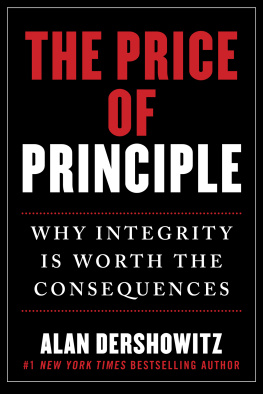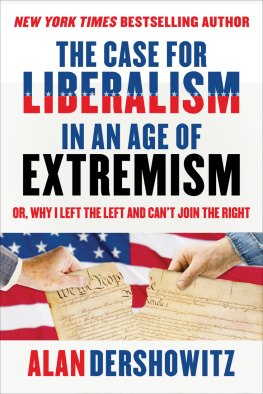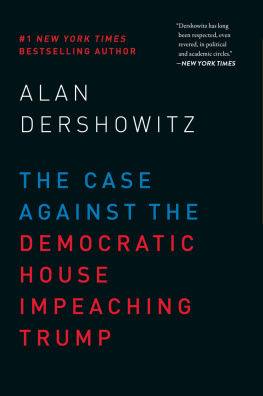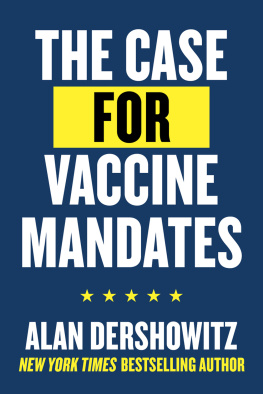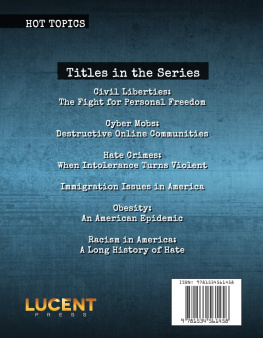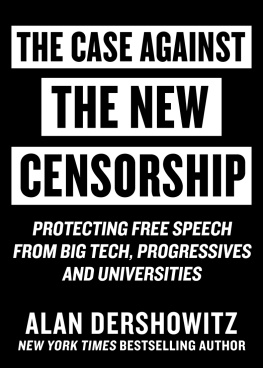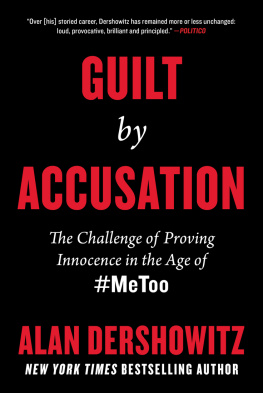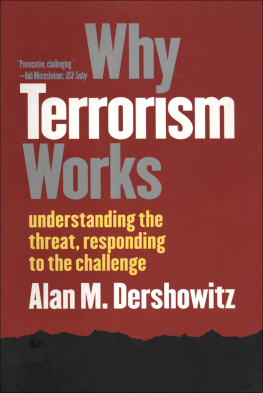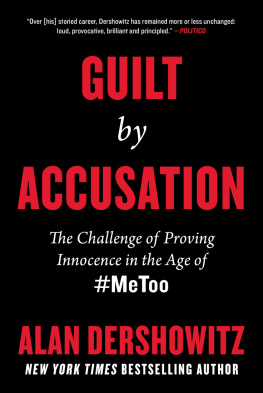

Also by Alan Dershowitz
The Case Against the New Censorship: Protecting Free Speech from Big Tech, Progressives, and Universities
Cancel Culture: The Latest Attack on Free Speech and Due Process
Confirming JusticeOr Injustice: A Guide to Judging RBGs Successor
The Case for Liberalism in an Age of Extremism: or, Why I Left the Left But Cant Join the Right
Defending the Constitution: Alan Dershowitzs Senate Argument Against Impeachment
Guilt by Accusation: The Challenge of Proving Innocence in the Age of #MeToo
Defending Israel: The Story of My Relationship with My Most Challenging Client
The Mueller Report (with an Introduction by Alan Dershowitz)
The Case Against Impeaching Trump
The Case Against BDS: Why Singling Out Israel for Boycott Is Anti-Semitic and Anti-Peace
Trumped Up: How Criminalization of Political Differences Endangers Democracy
Electile Dysfunction: A Guide for Unaroused Voters
The Case Against the Iran Deal
Terror Tunnels: The Case for Israels Just War Against Hamas
Abraham: The Worlds First (But Certainly Not Last) Jewish Lawyer
Taking the Stand: My Life in the Law
The Trials of Zion
The Case for Moral Clarity: Israel, Hamas and Gaza
The Case Against Israels Enemies: Exposing Jimmy Carter and Others Who Stand in the Way of Peace
Is There a Right to Remain Silent? Coercive Interrogation and the Fifth Amendment After 9/11
Finding Jefferson: A Lost Letter, a Remarkable Discovery and the First Amendment in the Age of Terrorism
Blasphemy: How the Religious Right is Hijacking Our Declaration of Independence
Pre-emption: A Knife That Cuts Both Ways
What Israel Meant to Me: By 80 Prominent Writers, Performers, Scholars, Politicians and Journalists
Rights From Wrongs: A Secular Theory of the Origins of Rights
America on Trial: Inside the Legal Battles That Transformed Our Nation
The Case for Peace: How the Arab-Israeli Conflict Can Be Resolved
The Case for Israel
America Declares Independence
Why Terrorism Works: Understanding the Threat, Responding to the Challenge
Shouting Fire: Civil Liberties in a Turbulent Age
Letters to a Young Lawyer
Supreme Injustice: How the High Court Hijacked Election 2000
Genesis of Justice: Ten Stories of Biblical Injustice that Led to the Ten Commandments and Modern Law
Just Revenge
Sexual McCarthyism: Clinton, Starr, and the Emerging Constitutional Crisis
The Vanishing American Jew: In Search of Jewish Identity for the Next Century
Reasonable Doubts: The Criminal Justice System and the O.J. Simpson Case
The Abuse Excuse: And Other Cop-Outs, Stories and Evasions of Responsibility
The Advocates Devil
Contrary to Popular Opinion
Chutzpah
Taking Liberties: A Decade of Hard Cases, Bad Laws, and Bum Raps
Reversal of Fortune: Inside the Von Blow Case
The Best Defense
Criminal Law: Theory and Process (with Joseph Goldstein and Richard Schwartz)
Psychoanalysis, Psychiatry, and Law (with Joseph Goldstein and Jay Katz)

This book is lovingly dedicated to my longtime colleague in the quest for equality, Professor Charles Ogletree, and to our mutual mentor, Professor John Hope Franklin, who taught us to advocate the equal protection of the law.

Copyright 2021 by Alan Dershowitz
All rights reserved. No part of this book may be reproduced in any manner without the express written consent of the publisher, except in the case of brief excerpts in critical reviews or articles. All inquiries should be addressed to Skyhorse Publishing, 307 West 36th Street, 11th Floor, New York, NY 10018.
Hot Books may be purchased in bulk at special discounts for sales promotion, corporate gifts, fund-raising, or educational purposes. Special editions can also be created to specifications. For details, contact the Special Sales Department, Skyhorse Publishing, 307 West 36th Street, 11th Floor, New York, NY 10018 or .
Hot Books and Skyhorse Publishing are registered trademarks of Skyhorse Publishing, Inc., a Delaware corporation.
Visit our website at www.skyhorsepublishing.com.
10 9 8 7 6 5 4 3 2 1
Library of Congress Cataloging-in-Publication Data is available on file.
ISBN: 978-1-5107-7021-8
eBook: 978-1-5107-7022-5
Cover design by Brian Peterson
Printed in the United States of America
Table of Contents
Introduction

I n August of 1963, I was twenty-four years old, had just completed my first clerkship with Chief Judge David Bazelon of the United States Court of Appeals for the District of Columbia Circuit, and was beginning my second clerkship with Justice Arthur Goldberg of the United States Supreme Court. Dr. Martin Luther King was coming to Washington to lead a rally for equal justice. Having spent many years fighting for equal justiceI went down south during the summer of 1962 and was active in college and law-school organizations fighting against racial discriminationI wanted very much to hear this great mans speech. But Supreme Court law clerks were told not to attend the speech because cases growing out of the event might come before the justices.
I decided nonetheless to attend, and I stood at the edge of the crowd listening to an array of speakers and singers. King then proceeded to mesmerize the crowd with his brilliant I have a dream speech. The phrase that impacted me most was his dream that someday his children would live in a nation where they would not be judged by the color of their skin, but by the content of their character. That was my dream, too, and I was determined to help make it become a reality.
Our neighborhood idol was Jackie Robinson, who, by his skill, speed, grace, and character, broke down the color barrier and became the best player on my beloved Brooklyn Dodgers. He led his team to several pennants and its sole World Series championship (only to be unceremoniously traded to the hated New York Giants at the end of his career, a trade Robinson rejected by retiring with dignity).
At college, my hero was Professor John Hope Franklin, the first African American to chair an academic department at a college that had not been historically Black.
At law school, two of my classmates were African American twins, one of whom went on to became a judge on New Yorks highest court, the other a professor. They made it by the content of their character, intellect, and work ethic.
As an Orthodox Jewish descendant of Eastern-European immigrants, I had not always been judged by these meritocratic qualities. When I applied to Wall Street law firms, I was turned down by every one of them, despite my credentials, which included being first in my class at Yale Law School, the editor in chief of Yale Law Journal, a championship debater, a prospective Supreme Court law clerk, and a potential professor at a leading law school. Wall Street law firms practiced a brand of legal apartheid: there were white-shoe firms that hired only White Protestants, with an occasional German Jew from a prominent banking family. But a Jewish kid from Brooklyn whose grandparents had immigrated from Poland was simply not eligible for these firms.
Next page

